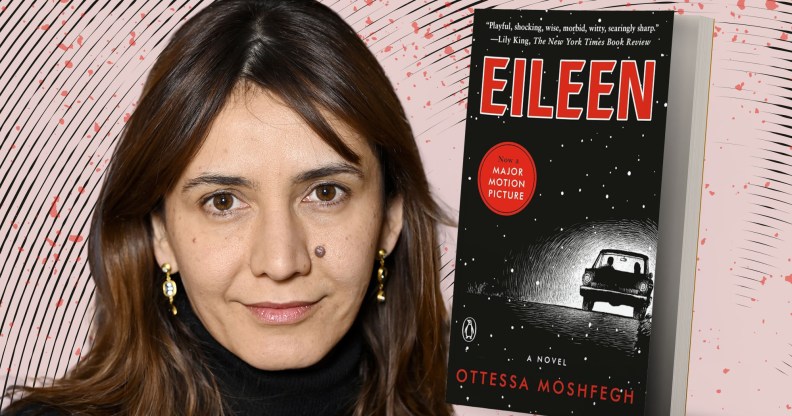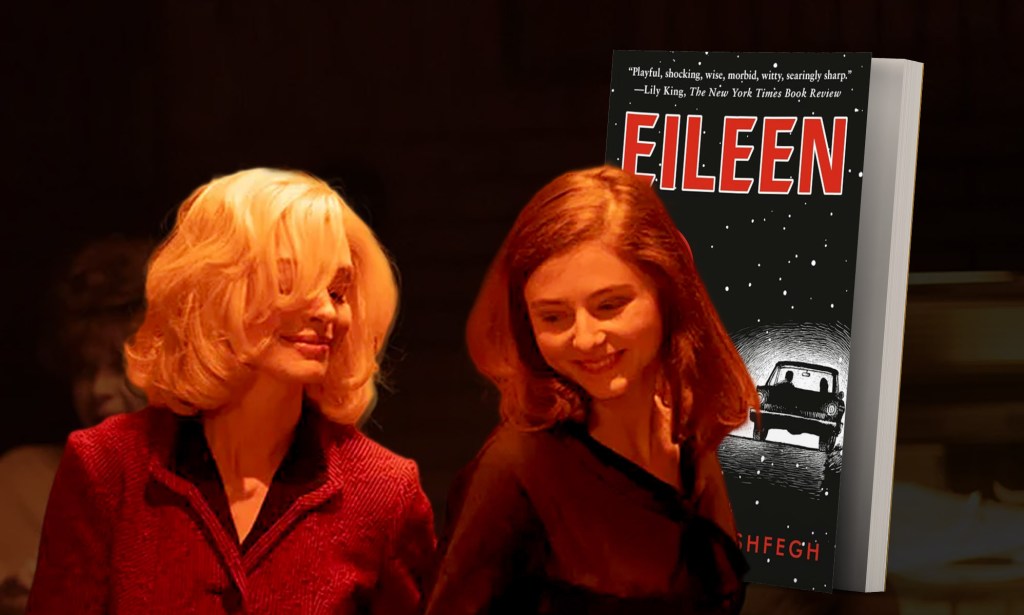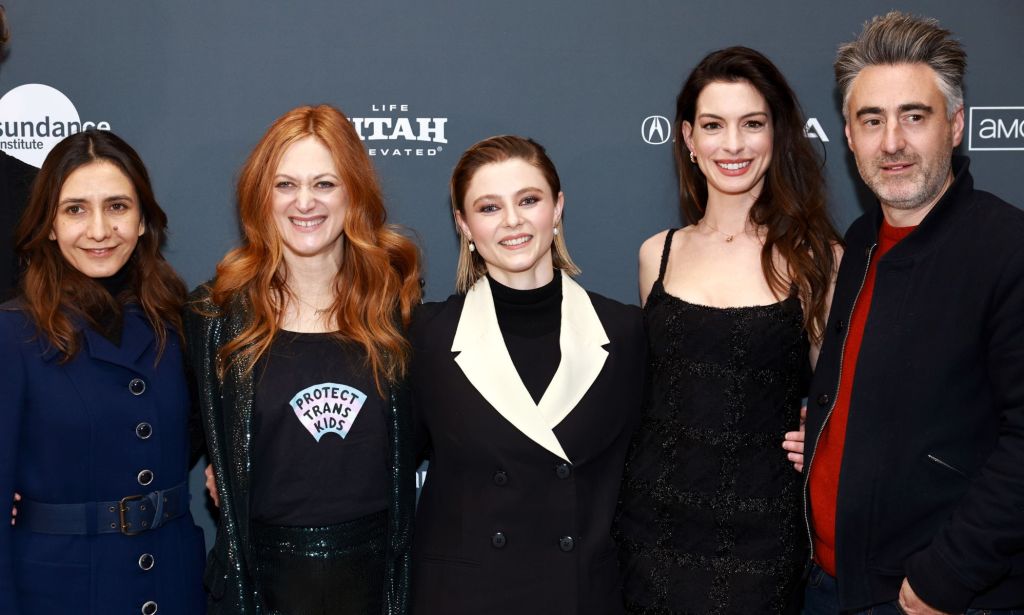Ottessa Moshfegh on bringing her sapphic thriller Eileen to the big screen: ‘Being queer isn’t just about non-heteronormative sex’

Critically-acclaimed author Ottessa Moshfegh talks bringing her queer novel Eileen to the cinema. (Getty/Penguin Press)
“When the book came out, I totally felt like I had no control over it at all,” says 42-year-old American writer Ottessa Moshfegh, and author of Man Booker Prize shortlisted noir novel Eileen.
In 2015, Moshfegh was forced to ruthlessly fend off criticism of Eileen and it’s main character, Eileen Dunlop, in interviews. Journalists thought the character was disturbed, abnormal and unpleasant.
Eileen is a plain, listless young woman working as a receptionist in an institution for young offenders in a small Massachusetts town, in the 60s. Her father is an abusive alcoholic, her mother dead.
She has sexual fantasies about the men she works with, savours thoughts of killing her drunkard dad, and is preoccupied by her own “torrential, oceanic” bowel movements. In Moshfegh’s view, she wrote an “honest” protagonist; the kind of person we all are behind closed doors.
“I felt really defensive,” she reflects. “People would say: ‘Why did you write such a disgusting female character?’ I always took that really personally. Disgusting? Only she can say that about herself.”
Having to navigate that constant analysis has served her well, and enabled her to emotionally detach from the macabre story. With a Hitchcockian film adaptation of Eileen by Lady Macbeth director William Oldroyd now in cinemas, she’s OK with letting her novel grow new legs and find a new audience.
“I just feel like I’m an older writer and not taking it all so personally. It’s nice,” she adds. She’s since released three novels, including 2018’s Gen-Z favourite, My Year of Rest and Relaxation.
While Moshfegh notoriously wrote Eileen, her first novel, using a 90-day book writing manual because she wanted to be “famous”, she teamed up with her husband, screenwriter Luke Goebel – who she met after he interviewed about Eileen – to write the film version.
Moshfegh and Goebel are sitting next to each in a lavish room at London’s Soho Hotel when we talk, explaining how they managed to turn the book, which is a retrospective, internal monologue from Eileen, into a narrative that could be communicated on screen.
Largely, it’s the same plot. Eileen, played by Jojo Rabbit star Thomasin McKenzie, is suffocated by her oppressive life: her horrid father, isolating hometown, dull job.
It’s the arrival of a glamorous, enigmatic new prison counsellor, Rebecca Saint John, brought to life by Anne Hathaway, who changes Eileen’s outlook on life and makes her dare to dream for more. There’s no happy ending though, as Eileen’s desire to please Rebecca has disastrous consequences.
In the eight years since its release, Moshfegh’s novel has been endlessly chewed over, with some heralding it as a queer thriller, owing to Eileen’s curious infatuation with Rebecca. In the book though, that desire is subtle. In Oldroyd’s film, it’s palpable, explicit even. On Moshfegh’s part, that change wasn’t intentional.
“Reading and seeing are two really different experiences,” she says. In the book, “there were suggestions that you could kind of pick up on. There are these question marks like, is this physical attraction? Is this romantic? Or is this platonic and there to serve a purpose about this character’s growth?”

Eileen joins Rebecca for dates in a local dive bar, and dresses up in her best clothes to head to Rebecca’s house for a pre-Christmas drink, eager for what the evening might bring. While the relationship never culminates in something physical, Moshfegh is comfortable with the ambiguity.
“I always felt completely at home in the grey in the novel, and very happy to not label it,” she explains.
“Even in the novel, Eileen says to the reader: ‘Was I in love with her?’ For me, that’s a perfectly natural question. I’ve definitely been in love with my girlfriends before,” she reveals.
“It’s not a dissimilar feeling from having fallen in love with my husband, even though he and I are close in a different way.”
This year has been a record one for LGBTQ+ characters and storylines in mainstream cinema: Red, White & Royal Blue, Bottoms and Passages brought us some of the most audacious examples of queer representation to date.
Other recent films, like Saltburn, Glass Onion: Knives Out and even Barbie, have been described as or anticipated to be queer, but fans have been left disappointed by a dearth of explicitly queer plotlines.
With Eileen, director William Oldroyd is more than happy for fans to call it a queer film. For Moshfegh though, it is a queer film.

“That’s one question that we’re getting a lot: Did we think of this as a queer movie? And I’m like, well, yes,” she says. “Because my definition of queer isn’t just a way of thinking about non-heteronormative sex. It’s also about non-heteronormative feelings and relationships, and those happen all the time and they need not be defined.”
“I think queerness isn’t just acts of sex, obviously, it’s about feelings,” agrees her husband Goebel. “I have met people who tell me that they have never had queer feelings and I don’t understand. I’m like, really?”
Goebel offers another way to view Eileen: it’s a novel and film about obsession and desire, but not necessarily about wanting another person, more just wanting a different reality to the one you’re currently living.
“I felt like we were in the realm of pure seduction and that seduction is about seducing another, but it’s also about seducing oneself, to have a different possibility of what one’s life could be and one’s connection to another person could be,” he shares.
While Eileen appears stone-faced and stoic and Rebecca seems confident and gregarious, both characters have vulnerability bubbling just below the surface.
Both are yearning for something unspoken. Eileen wants out of her small town, deadbeat life, and Rebecca is reaching out for a sense of companionship and solidarity in what appears to be quite a lonely life.
In Moshfegh and Goebel’s eyes, then, what they bring to each other’s life is far more than what any sex scene could offer.
“Rebecca starts telling Eileen, ‘you’re not a secretary, you’re bright, you have spirit’. She starts telling her, ‘I see you as something to be admired, desired,’ Goebel says.
“I think that sets off this desire for Rebecca that’s maybe even more so a desire for fulfilling some hunger to have what she wants, as a woman or as a person.”
Moshfegh adds: “I find that the power of a new relationship to disrupt your old way of seeing is kind of one of the only things that makes people change. Post Rebecca, Eileen is different. She has access to herself in a new way.”

Eileen offers Rebecca an escape in her own way too, Moshfegh believes, simply by being “game” for her criminal plan – even if it does end in tragedy (no spoilers here).
“Rebcca picks the right girl in a lot of ways. Anyone else in that movie would have would have just run out in horror,” she laughs.
Though it’s Moshfegh and Goebel’s storytelling, and Oldroyd’s direction, that makes Eileen one of 2023’s most enticing thrillers, the actors truly bring it to life.
Thomasin McKenzie’s version of Eileen is intriguingly understated; though she doesn’t appear as peculiar as in the book, you still can’t keep your eyes off her. Often, she manages to tell the story with just a glance.
Moshfegh doesn’t hold back any praise for the 23-year-old star.
“What Thomasin does in the film is just so immediately effective, which is that she vibrates with a youth and vulnerability and interiority that is visible in every moment. She doesn’t have that many lines and at every moment, I can feel her, and I think that’s just fascinating to watch.”
Marin Ireland delivers a stellar monologue as Rita Polk, the mother of incarcerated youth Lee Polk. Then there’s Anne Hathaway. Reviews have lauded her “magnetic” performance, commending her for stealing focus.
“For Rebecca, I mean, I don’t think we could have invented a better actor to play Rebecca than Anne Hathaway,” Moshfegh concurs. Everything that is seductive about Rebecca for Eileen, Anne Hathaway is for the viewer.
“I mean, these are the most incredible artists that I could have imagined collaborating with on this project.”
Eileen is out in cinemas now.
How did this story make you feel?

